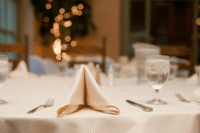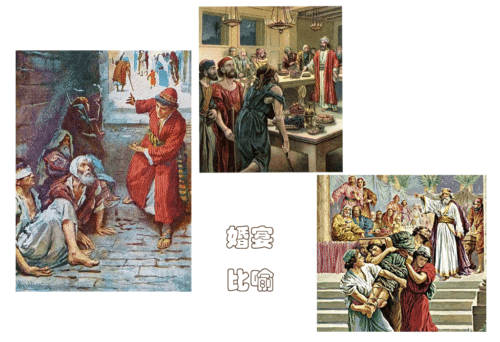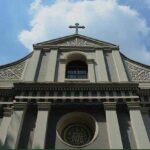
应邀赴圣宴
(玛22:1—14)
各位弟兄姐妹,
今天弥撒的读经一依撒意亚先知书(15:5—10)、读经二斐理伯书(4:10—14,19—20)以及福音玛窦福音(22:1—14)讲的都是有关婚宴的邀请。第一篇读经依撒意亚先知讲的是甘美的婚宴已经准备齐全;第二篇读经圣保禄宗徒告诉我们天主怎样满全我们的一切需要;弥撒福音玛窦圣史则借“婚宴和礼服”两个比喻,告诫我们:天主邀请所有人赴圣宴,但接受他邀请的人却很少。现在,我就以“应邀赴圣宴”为道理题目,跟大家分享今天弥撒的读经。
一、甘美婚宴已备齐
在婚宴的比喻中,主耶稣说,“天国好比一个国王,为自己的儿子办婚宴。他打发仆人……对被请的人说:看,我已预备好了我的盛宴,我的公牛和肥畜都宰杀了,一切都齐备了,你们来赴婚宴吧!”(2—4)
比喻中的“国王”是指天父;“国王的儿子”是指天父的爱子耶稣基督;“婚宴”,在新约中象征天国中的欢乐,也象征耶稣基督娶教会作祂新娘的筵席,还象征着教会的弥撒圣宴。
“公牛和肥畜已经宰了”,象征耶稣基督是天主的羔羊,为世人的罪孽,而被钉死在十字架上,成了我们得到天国欢乐的美好享受,成了我们从弥撒圣宴中领受的精神食粮——圣体圣血。
“一切都齐备了”,是指天主在基督里所预备天上各样属灵的福分,也指天主已经给基督所建立的教会准备好了所有属灵的福分,尤其是弥撒圣宴,因为弥撒圣宴是天国婚宴的预像和预尝。
有关天国婚宴的丰盛和美满,依撒意亚先知早已预言:“万军的上主在这座山上,要为万民摆设肥甘的盛宴,美酒的盛宴;佳肴是精选的,美酒是醇清的。……他要永远取消死亡,吾主上主要从人人的脸上拭去泪痕,要由整个地面除去自己民族的耻辱。到那一天,……我们要因他的救援鼓舞喜乐。”(依25:6—9)
因此,今天的福音告诉我们:天主为我们天上的天国,为我们地上的天国——教会,以及为弥撒感恩圣宴——教会最崇高的礼仪所准备的是充满一切甘美的婚宴。
各位弟兄姐妹,一些酒宴的邀请我们有时会推脱,但是婚宴的邀请,我们一般都会参加,因为我们知道,婚宴的邀请,既表示新人对我们的重视,而赴宴也代表了我们乐意分享他们一生重要时刻的喜乐。同样,天主建立教会,建立弥撒圣宴,并邀请我们参加,就是无限慈爱的天主希望我们像参与婚宴一样愉快地进入祂为我们准备的天国,永远分享祂的福乐;从祂所建立的教会,领受各种福分;从祂所建立的弥撒圣宴,领受永生的食粮。因此,我们应当愉快地追求天上的天国,毫不推辞地进入地上的天国——教会,并积极主动地参与弥撒圣宴。
二、 三邀四请赴婚宴
在国王把婚宴的一切都备齐后,就派仆人去召被请的人来赴婚宴,可是他们不愿意参加;国王又派其它的仆人去再次邀请,他们还是不理不睬:有的往自己的田里去了,有的作自己的生意去了;其余的竟拿住他的仆人,凌辱后杀死了。国王于是动了怒,派自己的军队消灭了那些杀人的凶手,焚毁了他们的城市。然后又派仆人出去到大路上,凡遇到的,无论坏人好人,都请来赴婚宴。
在这个“婚宴的比喻”中,原先“被请的人”,是指天主的选民——犹太人;第一次被打发的仆人,是指旧约时代的先知;第二次派去的“其它的仆人”,是指新约时代的耶稣的门徒。在大路上被邀请的人,是指外邦人。
国王三邀四请请人赴婚宴,既显示了天主父的忍耐、宽容和拯救人的决心;同时也揭露了我们人总是找各种理由,轻视天主的恩赐,拒绝天主的恩赐,甚至是恩将仇报。
拒绝天主邀请的结果是什么呢?是毁灭,永远的毁灭。就像那位国王一样,要派自己的军队消灭了那些杀人的凶手,焚毁了他们的城市。历史记载,天主多次召来了军队(如藉亚述灭了北方的以色列国;藉巴比伦倾覆了犹大国;主后七十年更藉罗马大军毁了圣殿)。第二次世界大战期间,把犹太人分散到天下,可怜的以色列民,成千上万死于战争、命丧于集中营的毒气。往事不堪回首,回顾人类历史,违抗天主命令的后果真是惨不忍睹。
但天主的救恩绝不会落空。当那些原先被邀请的人不愿参加婚宴时,国王就派仆人到大路上,把遇到的人,无论坏人好人,都请来赴婚宴,而且婚宴上就满了坐席的人。“大路上”,指世界的大舞台。凡听到基督耶稣福音的人,不分国籍、贫富和年龄、好人和坏人,只要愿意接受邀请,都可以来赴天国的婚宴。保禄和巴尔纳伯放胆地对以色列人说:“天主的圣道本来先应讲给你们听,但因你们拒而不受,并断定自己不配得永生,看,我们就要转向外邦人。”(宗13:46)
在福音里,拒绝赴宴人的借口理由是“有的忙于往自己的田里去工作,有的忙于自己的生意要去作”。我们有不少的教友在主日天,也是找出很多不是理由的理由不来圣堂:有些人会说:“我很忙…”,难道进教堂的教友们都没事可做吗?世上只有你是大忙人吗?有些人会说:“我要去走亲访友…”,难道耶稣不是我们的好朋友,不值得我们去看祂吗?也许有些人会说:“我有要紧的工作要做…”,请问工作是为人,还是人为了工作而活着?我们已经整整忙了六天,主日就这一天也停不下来吗?在我们的日程表上优先次序究竟是什么?整日忙东忙西,竟然把永生的天国也给忘了吗?小孩子和年青人会说:“我要郊游,或在家看电视……”,难道不可以先参与主日弥撒后,再去安心地郊游,或是安心地看电视吗?这些都不是理由。虽然我们都是被天主邀请赴“天国婚宴”的重要宾客,但是我们如果不认真对待这份邀请,那么我们就会像“婚宴比喻”中最先被邀请的客人一样,吃不到婚宴上的佳肴美酒,也享受不到婚宴的欢乐。因为“被召请的人多,被选上的人少”。
三、 穿上礼服享婚宴
在“礼服的比喻”中说,当婚宴的席位都坐满后,“国王进来巡视坐席客人,看见在那里有一个没有穿婚宴礼服的人,便对他说:朋友,你怎么到这里来,不穿婚宴礼服?那人默然无语。国王遂对仆役说:你们捆起他的脚和手来,把他丢在外面的黑暗中;在那里要有哀号和切齿。”
各位教友,看到这个比喻,你们是不是觉得很不可思议?当时这些宾客并没有准备参加王子的婚宴,是国王的仆人直接从大路上邀请来赴席的,他们当然不可能穿着礼服参加婚宴。为什么国王还责备那个没穿婚宴礼服的人不穿婚宴礼服呢?而且还叫仆人把他的手脚捆起来,扔到外面去。主人这样做,这是不是太过分了?
按照犹太人的习俗,主人在准备婚宴时,要准备一些礼服,给那些参加婚宴的客人穿。那个人虽被国王的仆人邀请来参加婚宴,但拒绝穿主人为所有的客人准备好的婚宴礼服,这是对主人的很大不尊重。
那么,礼服代表什么呢?礼服代表主耶稣基督。圣保禄宗徒在迦拉太书3章27节说:“你们凡是领了洗归于基督的,就是穿上了基督。”那如何才算是穿上基督?
圣若望宗徒说:“我看见有一大伙群众,没有人能够数清,是来自各邦国、各支派、各民族、各异语的,他们都站在宝座和羔羊面前,身穿白衣,手持棕榈枝。”“这些穿白衣的人是谁?他们是从那里来的?”“这些人是由大灾难中来的,他们曾在羔羊的血中洗净了自己的衣裳,使衣裳雪白,因此,他们得站在天主的宝座前,且在他的殿宇内日夜事奉他;那坐在宝座上的,也必要住在他们中间。”(默7:9,13—15)也就是说,我们必须藉着耶稣基督宝血的洗净,成为一个纯洁无罪的人。
结语:
各位弟兄姐妹,天国的圣宴已经备好,邀请函也已经送上,让我们穿上礼服赴宴吧!愿天主降福大家!阿们!

Come to the great Feast of the Lord
Welcome my brothers and sisters in Christ to today’s celebration of the Holy Mass. I pray that the merciful grace of the Lord will continue to flourish abundantly in your lives for years to come.
Today’s readings from the Book of Isaiah, [Is. 25:5-10] the Letter of Paul to the Philippians [Phil. 4:10-14, 19-20] and the Gospel of Matthew [Mt. 22:1-14] speak of an invitation to the Great Feast of the Lord Jesus. Summarizing these readings, the first one is prophetic in nature. It speaks of the Great Feast that is to come. The Second Reading echoes how God provides for our needs. The Third Reading tells us that God calls everyone but few answer His calling.
Reviewing the reading from the Gospel of Matthew, we perceive that there is a spiritual meaning involved. We are no longer at a Great Feast but at a Royal Wedding Feast. It is a Wedding Banquet that the Father gives for His Son. The Son is Jesus. The Bride is the invisible Kingdom of God on earth, the Mystical Body of Christ that is made visible through the Holy Catholic Church.
From the Old Testament, we learn that the first guests who were invited to the Wedding Banquet were the Jewish people and their leaders, they being God’s chosen people. Having rejected God’s invitation, the Lord sent out His invitation to the Gentiles, the non-Jewish people.
The invitations were sent out to all, the good and the bad. These generous invitations echo the abounding love and mercy of God that reaches out towards all, forgiving the sins of those who will sincerely repent of their evil ways in order to embrace a life of righteousness.
Today, the invited Gentiles are all those who have received the Sacrament of Baptism. Having been born again through faith in Christ by water and Spirit, they qualify as children of God if they persevere in their living faith until the end.
The necessity to persevere in the living faith is confirmed by the reference to the wedding robe. In those days, the proper garment to wear at a wedding was a clean white robe. The Book of Revelation tells us that those who are dressed in white are the worthy ones [Rev. 3:4] and the martyrs. [Rev. 6:9-11, 7:9, 13-4] Those who conquer, they will be clothed in white robes, and their names will not be blotted out of the book of life. Jesus will confess their name before the Heavenly Father and before the angels. [Rev. 3:5]
The mentioning of the good and bad is also symbolic of the condition of the Church throughout its history. Enduring until the Judgment, it is composed of sinners, some who persevere in their living faith and some who choose not to do so.
What is clear from this reading is that those who do not persevere, their punishment will be instant and severe. While all are called, not all answer their calling by the grace of God, some rejecting the invitation, some not accepting it fully. Not being adorned with a white robe that identifies them as children of God, those who neglect their salvation shall be thrown out in outer darkness where there will be weeping and gnashing of teeth.
In a few moments, we shall continue with the celebration of the Holy Mass. The Holy Mass is the Great invisible Wedding Feast that is opened to all those who have been baptized and who live their faith in Christ. These are the children who have been called by the Father of spirits [Heb. 12:9] to be united with Christ in One Holy Body to receive the Living Bread. The Living Bread, the Holy Eucharist, assures each and every one of us our salvation as long as this Church Sacrament is received in a state of grace. For it is very offensive to God to come to His Feast and receive the Living Bread while in a state of sin. Such a sinful act would parallel the guest who was not wearing a white wedding robe.
Let us continue to praise and worship the Lord for having blessed us with this great Feast through Christ our Lord.
